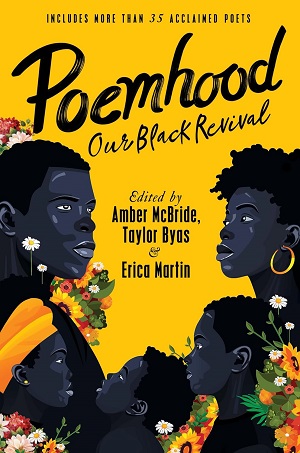
Poemhood: Our Black Revival: History, Folklore & the Black Experience: A Young Adult Poetry Anthology, edited by Amber McBride, Erica Martin, and Taylor Byas
I truly love the premise of this poetry anthology, and it absolutely delivers. There are times that I’ll read a collection or anthology of poetry or sometimes even a single poem, and it is so incredibly unrelatable to me as a Black person who lives in a city. I think this was my primary experience of poetry when I was a young adult, looking back at what is considered canon or classic. Finding entry points to poetry, especially for young people, and especially for young Black people, can be tedious if you don’t know where to look. This anthology feels like something that younger me would have appreciated because current me definitely does.
This anthology not only includes poems that are relevant to the Black experience (as mentioned in the title), but after each poem, it has a small paragraph of explanation, which makes it more accessible to a reader who maybe isn’t experienced with reading a lot of poetry. As per the introduction, this anthology is really a celebration of Black poetry, folklore, and history, and I love the range and variety of poems included. While poems about Black pain and Black trauma are deeply important, I appreciate that there are more than a few poems that focus on Black joy and even just Black existence. We’re here. We exist. We are not a monolith, and we move through the world in myriad ways.
As I alluded to earlier, this book also feels like a direct response to the types of poetry that are often taught in schools and the gatekeeping between who gets the title of poet versus who does not. The poetry included is not only contemporary, but it spans a range, so there are also poems from over half a century ago. It’s not only standing up to shout that “we’re here” but also “we have been here” and more than that, “we are here today because our ancestors survived being brought here.” I really loved this read.
Source link
